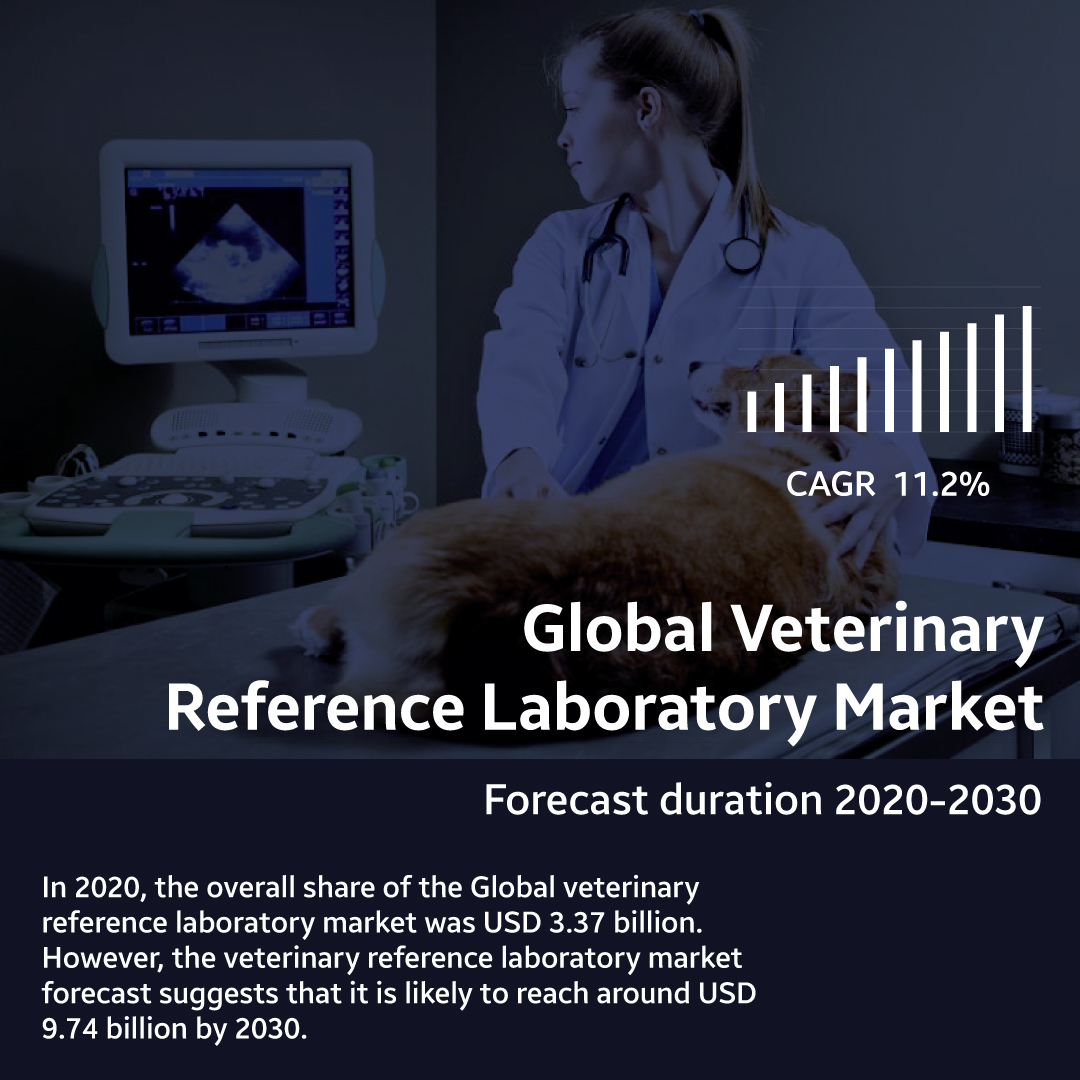A veterinary reference laboratory is a for-profit, privately owned facility that identifies zoonotic illnesses in domestic and farm animals. The labs are use to test animals for brucellosis, yellow fever, rabies, tuberculosis, anthrax, measles, and other diseases on a routine and specialize basis. In addition, they are employ to carry out pre-anesthetic assessments, conduct wellness exams, and keep track of treatment effectiveness.
The market for veterinary reference laboratories in 2021 was USD 3.74 billion and will reach USD 9.74 billion by 2030 at an 11.2% CAGR.
The market for veterinary reference laboratories is accelerating owing to the growing trend of pet adoption, rising demand for meat and dietary items made from animals, and rising costs associated with animal healthcare.
Market Dynamics
Drivers
The increase in pet adoption is the main driver of market expansion and development. Pets and other home animals have become essential and important household components worldwide. With the increasing human population, pet ownership has also increased. Over the past few years, the number and size of residential households in developed and developing countries with one or more pets have increased dramatically, greatly contributing to the growth of the pet population. Additionally, the growing propensity of millennials for pets has a beneficial effect on the expansion and development of the market.
Restraints
The absence of qualified medical specialists and experts in veterinary science and medicine may impede the growth and development of the worldwide veterinary reference laboratory market. There is a shortage of competent veterinary workers in many rural areas, developing nations, and other places. The elements creating the shortages are the harsh working conditions, a lack of adequate veterinary and medical infrastructure, and medical services. In most nations, the government outsources several duties to private vets, including mandated vaccines and initiatives to avoid disease.
Opportunities
The development of superior veterinary diagnostics due to more research studies affects the industry’s expansion. By using cutting-edge diagnostic techniques like polymerase chain reaction (PCR) and western blot, more illnesses can be accurately diagnose, contributing to the market’s expansion. Additionally, veterinary reference laboratories are significantly advancing the market by implementing modern technological advancements. The increasing frequency of various infectious disorders among animals fuels the market growth for veterinary reference laboratories.
Market Segmentation
- On the basis of animal type, the market segment comprises production animals and companion animals. In 2021, the companion animal segment held a significant market share of 53%. The increasing acceptance of companion animals in residences and homes across developed and developing parts of the world is responsible for the largest market share. Additionally, a rise in pet care costs brought on by a rise in people’s disposable income is projected to favor segment growth.
- On the basis of service type, the market is segmented into hematology, molecular diagnostics, clinical chemistry, immunodiagnostics, and others. The clinical chemistry segment led the entire market in 2021 with 35% of the revenue share. Clinical chemistry involves using tools like osmometers, chemical analyzers, pH meters, and others to examine, diagnose, and monitor bodily fluids like blood and urine. Animal disease diagnosis with clinical chemistry. This has increased the need for chemical analyzers and medical equipment among veterinary health professionals. As a result, this component supports segment expansion.
- On the basis of application, the market for veterinary reference laboratories is segmented into toxicology, pathology, product testing, and others. In 2021, the clinical pathology segment maintained the largest market position, with 35% of the revenue share, because of the growing popularity of pathology-related test services. In veterinary reference labs, pathology-related tests are carried out for routine examinations of pets and other animals.
Regional Analysis
The regional market is segment into Europe, North America, Asia Pacific, and Latin America.
North America held a considerable market position with 38.5% of the revenue share in 2021. The key driver of market growth and development is the growing emphasis on pet health and increased pet health expenditures. Additionally, the increasing adoption of family pets and the existence of well-known market players in the veterinary reference laboratory market are contributing to the expansion of the sector in that area.
Key Players
- Boehringer Ingelheim
- Idexx Laboratories, Inc.
- VCA, Inc. (A Part of Mars Petcare)
- Neogen Corporation
- Laboklin GmbH
- GD Animal Health
- Zoetis Inc.
- Virbac
- Synlab International GmbH
- Heska Corporation
- Thermo Fisher Scientific, Inc.
- Iowa State University (Veterinary Diagnostic Laboratory)
- Vetnostics
- Colorado State University (Veterinary Diagnostic Laboratories)
- The Pirbright Institute
- Texas A&M Veterinary Medical Diagnostic Laboratory
- University of Minnesota (Veterinary Diagnostic Laboratory)
- Protatek International Inc.
- National Veterinary Services Laboratory Usda-Aphis
- Animal and Plant Health Agency
- Animal Health Diagnostic Center (Cornell University)
- Washington Animal Disease Diagnostic Laboratory (Waddl)
- Friedrich-Loeffler-Institut (FLI)
The market for veterinary reference laboratories in 2021 was USD 3.74 billion and will reach USD 9.74 billion by 2030 at an 11.2% CAGR. The increased adoption of pet animals is the key element driving market development and expansion. Furthermore, factors such as the expanding number of veterinary professionals and medical practitioners and the rising need for pet animal insurance are propelling the market forward.




